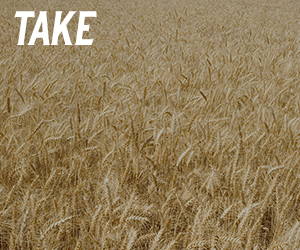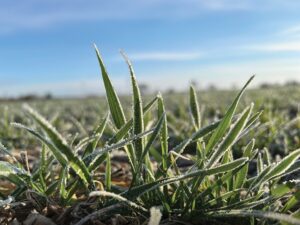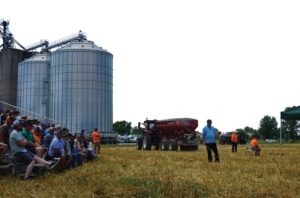Innovation in the field
How EMILI helps farmers adopt smart technology

Farmers are keen to adopt technology that will make their farms more efficient, reduce environmental impacts, or improve their bottom line—according to the 2021 Canadian Census of Agriculture, 92 per cent of Canadian farmers have adopted GPS technology, while one quarter of grains and oilseed producers reported using variable rate input applications and GIS mapping, a 59 per cent increase since the 2016 Census.
Barriers to adoption of technology, however, can limit or slow their uptake, including the high capital investment and training costs, skills and training gaps, insufficient infrastructure such as high- speed internet, and concerns about data privacy and security.
“There’s a broad range of attributes for farms and farmers, there’s a broad range of benefits and costs that need to be considered when we’re looking at new practices or new technologies,” says David Rourke, a Manitoba farmer, author, and soil health enthusiast who recently completed a PhD thesis, ‘In Search of Net Positive Carbon Grain Farms in Western Canada, Innovation in Policy and Practice.’
Ultimately, Rourke says the effectiveness and usefulness of a tool or technology will impact a farmer’s decision-making about adoption. “Does [the technology] provide a valuable service? Does the tool just provide data, or does it provide useful information? Is it effective, efficient, and reliable?”
“It’s not always financial,” he continues. “There is convenience and comfort. What’s the return on investment on a quiet, air- conditioned cab on your combine?”
EVALUATING TECHNOLOGY
Providing answers to some of these questions is the role of the Enterprise Machine Intelligence Learning Initiative (EMILI), a Manitoba-based non-profit that works collaboratively with producers, industry, investors, and innovators to grow a sustainable and economically resilient digital agriculture industry.
Founded in 2016 by community leaders with a common goal of advancing agricultural technologies, EMILI launched its Innovation Farms powered by AgExpert in 2022. Operating on a 5,500-acre farm in Grosse Isle, Manitoba, with the later addition of an 8,500-acre farm in MacGregor, Manitoba, EMILI works with partners across the value chain to advance innovation adoption across Canada.
“We work with different ag tech [companies] to test, validate, and demonstrate new technologies in a real-life setting,” says Leanne Koroscil, Innovation Farm manager. “We work with a number of collaborators from across the industry, giving them access to leading-edge equipment, technology, and production practices.”
Among the technologies on the farm are weather and environmental sensors, drone sensors, satellites, and RFID tags on equipment, in addition to 10 years of historical farm data. This, says Koroscil, helps partners test and demonstrate their product or innovation in real farm conditions.
EMILI PROJECTS IN ACTION
One notable collaborator is Gecko Strategic Weed Management, a Canadian company using AI and predictive analytics to detect herbicide-resistant weeds like wild oat and kochia. EMILI’s Innovation Farms provided the real-world environment for validating AI-driven weed mapping, satellite-based species identification, and digital prescription maps for sprayers and seeding drills.
“They use this information to create a digital prescription map that the sprayer or a seeding drill can read,” says Koroscil. “You put it into that piece of equipment, and it’s able to target and use variable rate application.”
The partnership with EMILI helped Gecko scale rapidly. “They initially began their work with just three farms across Canada,” says Koroscil. “After a number of years, they’ve grown to 250 fields on 130 farms across Canada. Thanks to the work that we’ve done here at Innovation Farms, they’ve been able to take [the technology] from pre-commercial to commercial.”
Through these projects, EMILI offers ag tech companies a rare opportunity: testing innovations at commercial scale, in real farm conditions, without the risks typically associated with new technologies.
EMILI SUPPORTS A WIDE RANGE OF ADDITIONAL PROJECTS BEYOND WEED MANAGEMENT:
- Autonomous equipment trials – Testing driverless tractors, grain carts, and sprayers to increase labour efficiency during peak periods.
- Smart fertility trials – Real-time nitrogen sensors, variable- rate side-dressing, and in-season fertility recommendations powered by AI.
- Soil health monitoring – On-the-go soil sampling, carbon sequestration measurement, and mapping field variability to improve environmental sustainability.
- Digitized farm operations – Integration of farm data through platforms like FCC AgExpert, helping farmers reduce time spent on data entry and make better- informed decisions.
- AI scouting tools – Drones and satellite imagery to monitor crop health, disease, and pest outbreaks at scale.
- Workforce development programs – Training youth and early-career professionals on digital agriculture skills, bridging the skills gap in Canada’s ag tech workforce.
THE POWER OF DATA
EMILI is hosted on Rick Rutherford’s Grosse Isle farm, which he describes as “not your typical farm.” As early adopters of farm technology, Rutherford and his team built a culture of innovation, gathering data that has chronicled every facet of his 5,500-acre farm over the past 12 years.
“The challenges we were running into,” he says, “are that we had all these data sources that weren’t compatible. That’s one of the huge issues we deal with today in ag, bringing the data together in a format that you can actually look at and be able to assess.”
“Now, I can pull out my phone, and I can pull up every field and figure out everything we did to that land in the last 12 years.”
For Rutherford, the key to adoption is simplicity. Farmers want technology that makes their work easier and de-risks the unknown.
DE-RISKING TECHNOLOGY FOR FARMERS
“The one thing we’re able to do…with projects on the farm is to de-risk farm technology,” says Koroscil.
“That’s the beauty of what we have here at the Innovation Farm,” says Jacqueline Keena, EMILI’s managing director. “The ability to test, at full scale, in a real commercial setting, and take those innovations as far as they can go.” •



























